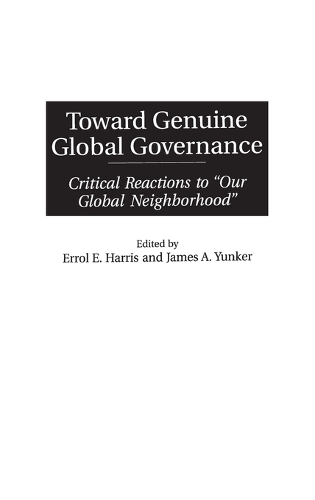
Toward Genuine Global Governance: Critical Reactions to Our Global Neighborhood
(Hardback)
Publishing Details
Toward Genuine Global Governance: Critical Reactions to Our Global Neighborhood
By (Author) Errol E. Harris
By (author) James A. Yunker
Bloomsbury Publishing PLC
Praeger Publishers Inc
30th June 1999
United States
Classifications
Tertiary Education
Non Fiction
Constitution: government and the state
Migration, immigration and emigration
Civics and citizenship
History of ideas
321.04
Physical Properties
Hardback
224
Width 156mm, Height 235mm
425g
Description
Nine well-known authors associated with the world federalist movement critique the 1995 Report of the Commission on Global Governance entitled Our Global Neighborhood. Although the contributors manifest a variety of viewpoints, styles, and approaches, they are unanimous in condemning the Report as insufficiently imaginative and visionary. Despite repeated calls in the Commission Report for a radically new way of thinking, the substance of the Report mindlessly rubber-stamps the legitimacy of the sovereign nation-state system of today, by means of summarily and peremptorily dismissing even the possibility of a supernational government qualitatively beyond the United Nations. According to the contributors, the concept of genuine world government is sufficiently advanced, and the circumstances of the present day are conducive, so that this concept is deserving of the most careful and serious attention by the general public and the political leadership. Despite their unconventional conclusions, these essays are lucid, judicious, and commanding.
Author Bio
ERROL E. HARRIS is John Evans Professor of Moral and Intellectual Philosophy (Emeritus) at Northwestern University. In his long and distinguished academic career, Professor Harris served as a teacher, administrator, and researcher in the United States and the United Kingdom. He is the author and editor of 23 books. JAMES A. YUNKER is Professor of Economics at Western Illinois University. Author of five books and more than 60 articles in professional journals, Professor Yunker's research interests focus on market socialism and the application of economic methodology to non-traditional areas such as criminal justice and international relations.
